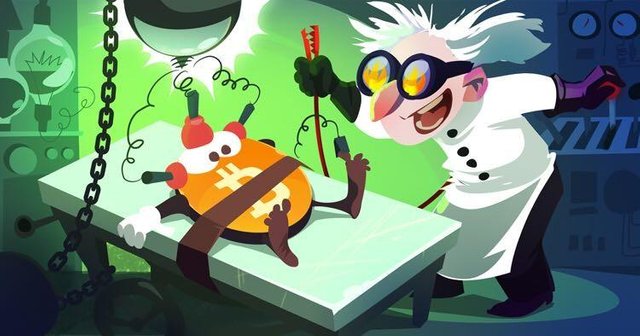CryptoCurrency today Balkan >> How Will Blockchain Change the Fundamental Scientific Sector?
Blockchain already makes people change their views on various social institutions. In previous materials, we talked about how blockchain influenced pop culture, the music industry, and the government apparatus. In this article, we will tell you how the development of blockchain influenced science. 
A New Era in the Financing of Science
—————————————————-
Modern fundamental research requires scientists to work long and hard. Some of these studies are helping to create new products and services. But, despite the fact that successful financial strategies are already in place to support many developments, blockchain can radically change the approach to the very process of interaction between the scientific community and the rest of humanity. The tokenization of scientific assets belonging to academic institutions and research laboratories can become one of the ways to avoid the classical system of financing science.
Scientific assets require a longer investment timeframe and considerable initial investment, which significantly limits the range of possible contributors. Even venture capitalists, who are often invested in illiquid high-risk assets, largely avoid financing new academic projects.
Tokens will help solve this problem, as they are registered and traded on decentralized exchanges, which are unbound by obligations with majority investors. This makes it possible to requalify the risks into permanent ones and thereby attract a wider range of investors.
On the other hand, we must remember that special rules are needed for the scientific crypto investment market that would protect both investors and the innovations themselves. If we can understand how to do this in the most professional way, while maintaining a delicate balance, then science can become an independent alternative asset class.
At the moment, companies like Scienceroot and Pluto are already developing experimental projects for scientific research. Scienceroot is going to raise $20 million to help pay for the works of reviewers and authors on its platform. The project is going to change scientific tokens for Ether.
Nevertheless, according to some experts, scientists and entrepreneurs may be tempted to add the technology solely to make their projects look distinguishable, "magical, and bright." As evidence of this concern, the Deloitte consulting firm has identified over 24,000 interrupted, mostly financial blockchain projects on the GitHub software development platform in 2016. "Investments in science will still remain high risk," says Martin Hamilton, a London resident futurist from Jisc, who supports digital education services in the UK. “But, the reward can be huge if you are willing to accept weighted risks."
Medical Research
————————-
According to Claudia Pagliari, who studies health control technologies at the University of Edinburgh, blockchain has huge potential in the development of science, but researchers still have to properly study the ethical issues associated with new technologies. "What happens if the patient withdraws consent to a trial test, which is invariably recorded on the blockchain? Unfair research can introduce fake data into the blockchain, because the process is so open that anyone can see who adds it," says Pagliari. "And after addition, no one can change this information."
Pagliari believes that researchers who are implementing blockchain into their research are beginning to take a more thoughtful approach to their projects. Many of her colleagues say that despite the mad excitement around the new technology, it is worth taking a balanced approach to the implementation of blockchain in all areas of scientific activity, since the thoughtless use of technology can lead to the collapse of the entire, well-functioning system.
Blockchain in Statistics and Social Engineering
—————————————————————-
The Attorney General of the US state of Virginia said in his report that immigrants without documents in Arizona are more likely to end up on the prosecution stand than those with documents. He referred to the materials of the Udall Center for Studies in Public Policy at the University of Arizona.
A fatal mistake was later discovered in this study that shattered all the conclusions presented. In fact, all available literature claimed the opposite. This is not the only example of incorrect data analysis. False statements can be found in the studies of all branches of science.
Every year, the US invests billions of dollars in research, which serves as a basis for making certain political decisions, so it is critical that scientists deliver hard facts and not illusions.
And blockchain can help here, too. By means of authentication and certification of the submitted data, the scientific community will be able to minimize the risks of erroneous conclusions and restore confidence in the public eye. Blockchain can help scientists reliably collect and store data related to research activities. This will seriously facilitate the reproduction of the results in cases where published reports do not have enough methodological components. Distributed registries can also help in tracking each transaction during peer review.
Open blockchains will also help with the frequency of collection of data by researchers, thus allowing ordinary people to understand the scientific process better than studying something solely on the basis of indicators, such as publications and citations.
Each year, about 2.5 million studies are published on innovative discoveries and solutions. More than ⅔ of scientists who tried to repeat the presented experiments, however, failed. Thus, a quantitative analytical error can turn research upside down.
According to some scientists, the results of such works are very unreliable. According to the editor in chief of the medical journal The Lancet Richard Horton, about half of all publications are erroneous. He is sure that both invalid exploratory analyses and blatant conflicts of interest are to blame for this.
"Look at real cancer research. In 2012, scientists tried to reproduce 53 major recognized studies in this area and were able to replicate only 6 of them," Horton complains.
Intellectual Property
—————————-
Even now, scientists can share "raw" materials before publication, but they have little incentive to do so. Blockchain will make the authentication, exchange, and certification of articles a much faster and more convenient process. And scientists will not be afraid for their copyrights, which is also important in this matter.
A decentralized register can also revolutionize the research phase. Instead of publishing a simple data set only after the publication of the scientific article, researchers will be able to download it directly after collection. The timestamp will mark it as "your own,” not letting others steal it, and thereby nullify all possible disputes regarding intellectual copyright for this or that study in the future.
This will be a huge step forward from our current system of assessing and publishing scientific articles. Even now scientific works suggest the existence of an expert assessment. Therefore, reviewers often make their suggestions and recommendations after reading the review of the research.
In addition, after recognition of blockchain as an excellent tool for verifying proposed data in the future, academics will be able to bypass even recognized publishers acting as intermediaries and post their articles online. Such consequences can become fatal for scientific institutions and a breakthrough for individual scientists and world progress as a whole. Because facts must remain facts.
It is still unclear whether blockchain will be able to liquidate scientific bureaucracy and rid revolutionary discoveries of red tape and unscrupulous intermediaries, and the scientific publications themselves from errors and forgery. But it is already obvious that science is one of the sectors in which decentralized registers and cryptos can become a formative vector of its development for many years to come.
—————————-
Don’t miss out next post! Comment, ask, upvote and don’t hesitate to upvote! 